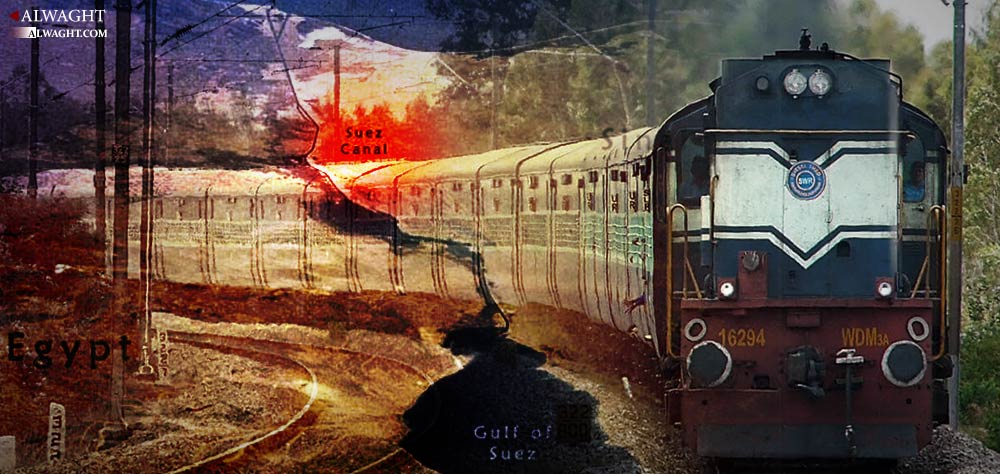Alwaght- Egyptian Minister of Transport Hesham Arafat has said that his country intends to link the Port of Al Alamein on the Mediterranean coasts to the Port of El Sokhna on the Red Sea coasts through a high-speed railway.
Reports say that over 10 international companies have announced readiness to race for the contract and very likely the construction operation of this strategic project will start from July this year.
But it is not only Egypt’s railway project that seeks to connect the Mediterranean and the Red Sea. Before that, the Israelis had also unveiled a project to link the Port of Eilat on the Red Sea to the Port Ashdod on the Mediterranean. Tel Aviv started the studies on the project in 2012 and the cabinet gave it the go-ahead in 2014. But the construction operation has not started yet.
According to the Egyptian and Israeli plans, the Red Sea is expected to be linked to the Mediterranean Sea by to train lines.
Suez Canal loses importance?
The analysts suggest that the first influence of the new railway connecting the two seas will be on Egypt’s Suez Canal. The construction work of the major canal ended in 1869. Its main function has been linking the Red Sea to the Mediterranean. But will it lose transit significance if the two railways become operational?
For the vessels passing through the Suez Canal, which goes through Sinai desert as one of the most insecure parts of Egypt, the most challenging issue has been the insecurity.
Between 45 to 55 ships per day cross the international watergate which carry some 2.975 million tons of cargos. These figures very well display how important is the human-dug waterway. But there have always been fears of the merchant ships coming under attack in Sinai Peninsula, a bastion for an array of terrorist groups in the country. In case of the existence of railroad, part of the cargos will be transported to their destination through ground mainly because of the relative advantage of security offered. Still, Suez Canal will save its significance for the ships coming from the European and American ports and heading to East Asia, East Africa, and Oceania.
Tel Aviv hopes for Suez Canal weight loss
Total significance of Suez Canal is not because of its economic advantages. Rather, part of its importance comes from its geopolitical position. The watergate offers Egypt a tremendous geopolitical place in the region and on the international stage. The country suffered a war in late 1956 because of the importance of the canal.
But such a position of the canal and Egypt has had a constant opponent: the Israeli regime. The war of 1956 sparked following Israeli forces’ invasion of the Suez Canal and the subsequent support to them by Britain and France. Six decades after the war, the Israeli cabinet’s decision to link the Red Sea to the Mediterranean lays bare the fact that Tel Aviv still seeks alternatives to the Egyptian canal.
A substitute route to the Suez Canal can offer economic benefits to the Israel that can be easily tracked in the remarks made by the regime’s Primer Benjamin Netanyahu. In a meeting with the experts of a think tank in Tel Aviv in 2012, Netanyahu had highlighted the Israeli ports’ potentials to become offer alternatives to the Suez Canal.
Salem Y. Lakhal, a professor at Université de Moncton of Canada, in his article, titled Will Red Sea-Mediterranean Railway Rival Suez Canal?, said the ultimate Israeli intention is ground imports from Asian countries such as China and India to the Port of Eilat and then sending them out of the occupied Palestinian borders using the Port of Ashdod.
In the upcoming years, Tel Aviv intends to follow a policy of re-exportation of the Chinese and Indian products. This, on the one hand, will help it circumvent Suez Canal under the excuse of lack of adequate security and, on the other hand, will improve its regional position and better counter its regional isolation challenge.
Sinai desert terror groups, Tel Aviv’s trump card
With regard to the Israeli regime’s objectives, Egypt’s plan to build a Red-Med railway is simply a reaction to Tel Aviv’s project rather than a plan eyeing trade goals.
Meanwhile, the Israeli regime’s play card in this tough competition is the continuation of the insecurity in the Sinai desert and the political instability in Egypt. This means that the more insecure the Sinai desert and the vicinity of Suez Canal becomes the closer becomes the Israeli plan for Port of Ashdod to realization.
The important issue is that the terrorist movements in the Sinai have increased as the Israeli regime unveiled the plans to construct its railroad.
According to professor Salem Lakhal, one of the main concerns of the Israelis since the 1956 war and then 1967 war was a fear of seeing Suez Canal blocked which would disrupt their marine trade which acts as a lifeline to the Israeli regime’s economy. In fact, since the emergence of the terrorist groups, especially ISIS, in the region, Tel Aviv was rewarded a golden chance to inflame the instability, mainly in Sinai desert, to overcome the ground encirclement and cut dependence on the Suez Canal and Bab-el-Mandeb Strait.
In these conditions, the Egyptian security apparatus and the leaders should know the certain fact that the key to saving the superior strategic position of Suez Canal lies in securing the Sinai Peninsula and more serious confrontation of the terrorist groups. Egypt appears to have understood this necessity and so far has taken serious crackdown on the terrorists there.



























